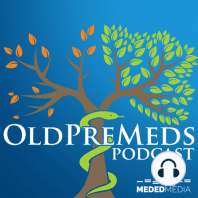10 min listen

37: Is Research More Important than Clinical Experience?
37: Is Research More Important than Clinical Experience?
ratings:
Length:
10 minutes
Released:
Aug 31, 2016
Format:
Podcast episode
Description
Session 37 Each week, Ryan pulls out a question from the forums over at OldPreMeds.org so we can deliver the answers right on to you. This week's question comes from a student asking about research experience, specifically about whether admissions committees are biased towards applicants with research experience that they would value it over clinical observation. OldPreMeds Question of the Week: Looking through the MSAR Admissions Requirements, one of the things that jumped out at them was the percentage of accepted applicants with research.lab experience. In many cases, the school reported higher numbers of accepted students with this experience than physician shadowing/observation, typically in the 85-95% range. Are admissions committees biased towards applicants with research experience that they would value it over clinical observation? Or is it that more students are reporting their lab experience from prerequisite coursework? Here are the insights from Ryan: Medical schools need to understand that you know what it's like to be a physician; hence, the importance of shadowing. You don't need a ton of shadowing to understand what it's like. However, shadowing is not the same as clinical experience. While technically you're close enough to smell patient, you're still not really "smelling" the patient. Clinical experience involves patient interaction or getting your hands dirty doing patient care. Work like being a CNA,paramedic, EMT, nurse, or PA are huge clinical experiences. Research is something that is perpetuated in the premed world as a necessity to get into medical school. Caveats: If you want to go into an MD/PhD program, research is the main driver during your premed years to get into an MD/PhD program. If you want to go into a research-heavy institution, research is going to be very important. The emergence of evidence-based medicine: The actual act of research is not necessarily important but it's important that you understand the process. You don't need to publish anything to get experience and gain benefit from research, However, as a physician, it is important that you’re able to read research articles and statistics and understand everything that goes on behind the scenes with researching and the scientific method. The admissions committees are not leaning one way or the other. They only need to make sure you know what life is like as a physician so they're looking for the clinical experience. Major takeaways from this episode: Shadowing shows you what's it's like to be a physician. Clinical experience proves you actually like being around sick people. You don't have to have research (although some schools require it like the University of Utah which have set number of hours of research, shadowing, and volunteering) Look at each of the schools you're interested in applying to. See what they require and then follow what you enjoy the most after all of the requirements are met. Links and Other Resources: www.mededmedia.com MSAR Admissions Requirements University of Utah Medical School Admissions
Released:
Aug 31, 2016
Format:
Podcast episode
Titles in the series (100)
25: Should I Drop Out of My Masters Program and do a Postbac?: Session 25 In today's episode, Ryan and Rich take a question pulled out directly from the forums over at OldPreMeds.org as they discuss getting a master's program versus postbac program. OldPreMeds Question of the Week: Poster, Megan, is a... by OldPreMeds Podcast